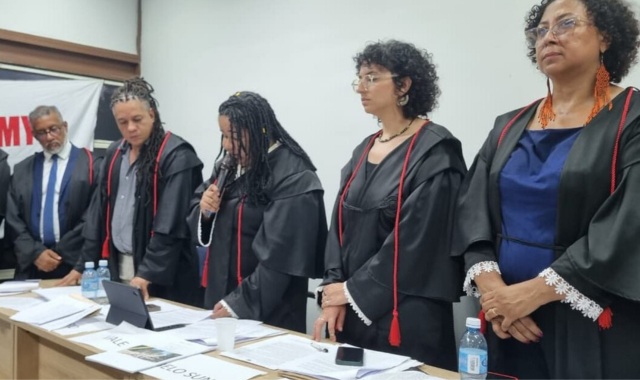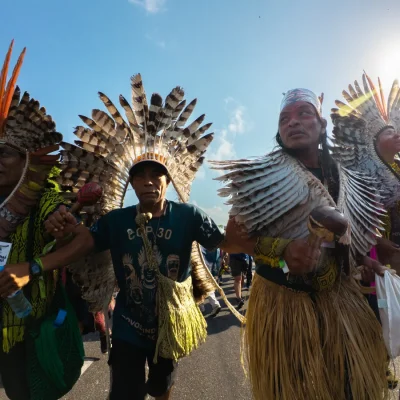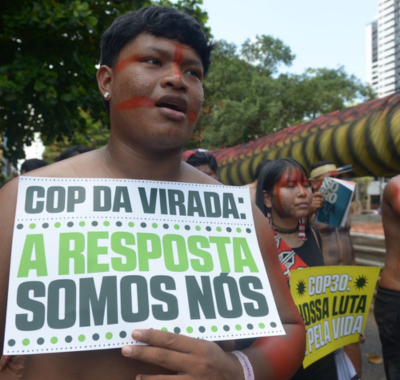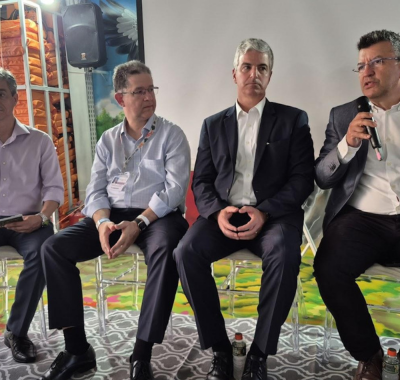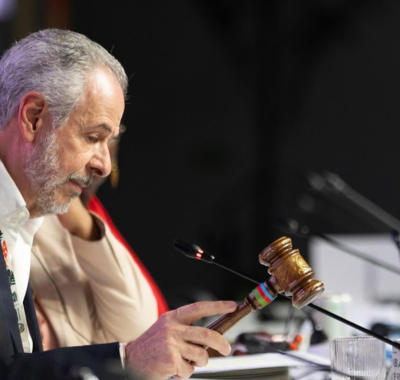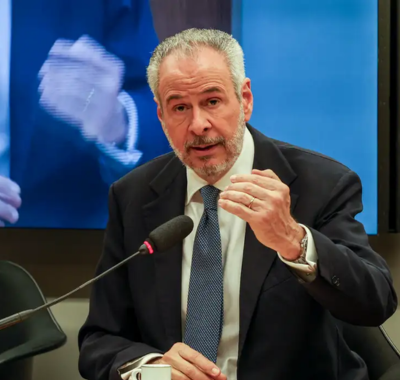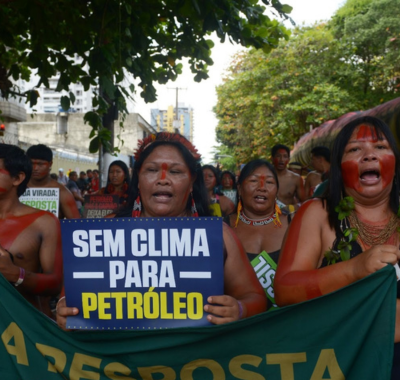Vale, Hydro, and Belo Sun were accused in a symbolic tribunal in Belém, Pará, where Indigenous groups, quilombola communities, and smallholder farmers allege mining causes river contamination, deforestation, increased violence and rising illness. The companies deny the impacts.
By Isabel Harari
BELÉM, Brazil — Major mining companies Vale, Hydro, and Belo Sun, along with the Brazilian state of Pará, were symbolically “convicted” on Thursday, Nov. 13, for human rights and environmental violations during a demonstration by social movements in Belém. The “People’s Tribunal” took place as part of the People’s Summit, a parallel event to the United Nations Climate Change Conference, COP30.
About 150 participants—including Indigenous people, quilombolas, and family farmers—gathered at the Federal University of Pará to condemn river pollution and a rise in deforestation, violence and health crises, which they attribute to mining activities.
“This may be a symbolic tribunal, but it gives voice to people harmed by this development model,” explained João Gomes of the non-profit FASE (Solidarity and Education), one of the event’s organizers.
Civil society representatives acted as prosecution and defense for the mining firms, while witnesses gave testimony before a “jury” of seven social movement members.
“I call on the tribunal to hold the defendants responsible for crimes against the Amazon, Brazil, and its peoples. Their actions should be deemed immoral and shameful, as both their deeds and failures directly fueled climate destruction,” declared Jéssica Silva, attorney from SDDH (Society for the Defence of Human Rights in Pará), who presided over the symbolic jury. The tribunal’s resolution was forwarded to the COP30 presidency (see full document).
‘Sacrifice zones’ for mining
At the opening of the event, João Gomes of FASE announced the names of the witnesses invited to recount how their territories have been turned into “sacrifice zones for mining,” he said.
The first testimony came from Jeovan Almeida, resident of Jambuaçu quilombola territory in Moju, Pará. He alleged Hydro, a Norwegian mining company, contaminated and silted a nearby stream flowing through their land. Almeida said a bauxite pipeline crosses the territory, affecting all 15 quilombola communities. “Fish have died and people have stopped drinking the water,” he recounted.
Four residents of Barcarena also reported harm caused by Hydro and other companies in the area’s industrial complex.
Hydro, the Norwegian conglomerate, operates Alunorte—one of the world’s largest alumina refineries—in the municipality. “We suffer contamination by pollution carried through air, water and soil,” said Carlos Augusto Góis Espíndula, from the Tauá territory, home to Indigenous people, quilombolas and agro-extractivists. He added their community is just three kilometers from two solid waste deposits.
Manuel Poxo Munduruku also spoke about water contamination. “It’s impossible to bathe in the river—the water has turned the color of clay,” said the Indigenous resident of Piquiarana village in the upper Tapajós.
During a panel at the Blue Zone on Friday morning, Hydro President Anderson Baranov said the company strives to be a “good neighbor.” “Being a good neighbor means pursuing dialogue, investing in social programs, human rights, and ensuring these investments benefit everyone—not just the mining company,” Baranov stated.
In response to Repórter Brasil, Hydro denied that its bauxite pipeline pollutes streams, claiming its processing uses “solely water” and that the slurry transported contains no chemicals and is considered non-hazardous. The company said it implements conservation measures along all 244 kilometers of its pipeline and conducts regular inspections focused on safety, air quality, water control and waste management.
The company also said it “vehemently” denies allegations of environmental harm from Alunorte’s operations in Barcarena, asserting there is no technical evidence to support such accusations (see full response).
Vale faces criticism over impacts of Carajás Railroad
Vale, the Brazilian state mining company, also faced scrutiny. Antônia Flávia, resident of Piquiá da Conquista settlement in Açailândia, Maranhão—along the Carajás Railroad owned by Vale—described the conditions. “The air pollution is overwhelming; public health has been utterly devastated,” she said.
In a statement to Repórter Brasil, Vale said the company and the Vale Foundation invested US$8.49 million (R$45 million) in a new neighborhood, “delivered in October 2024 to families from the old Piquiá de Baixo district.”
Vale also stated it is “committed to respecting and promoting human rights, preventing risks and potential impacts throughout all its activities and across its value chain.” It emphasized commitment to “social and environmental integrity” and ongoing dialogue with nearby communities.
“We have put in place controls, monitoring and frequent inspections across our operations and neighboring areas. We maintain regular contact with business partners to ensure environmental efficiency and safety when transporting minerals, and we have established policies aimed at minimizing environmental impact,” the company continued (see full response).
Impacts linked to Belo Sun, a Canadian mining company on the Volta Grande do Xingu in Altamira, Pará, were also raised. “Belo Sun is stealing land from farmers,” said Luiz Claudio Teixeira of the Xingu Alive Forever Movement.
The company obtained a repossession order in Pará’s courts to evict landless workers encamped on an area it has claimed since 2022. According to the Pará State Public Defender’s Office (DPE-PA), overseeing the case, the eviction could displace about 1,000 residents from four local communities.
Belo Sun was contacted for comment but has not yet responded. The space remains open for a response.
Manuel Poxo Munduruku further criticized the Pará state government’s failure to address the devastation caused by mining and illegal prospecting for gold and other minerals, such as cassiterite. “There is no difference between legal and illegal mining—we are fighting for zero prospecting,” he asserted.
The Pará government was contacted Friday for comment but has not yet responded.
High-tech industry invoked in defense of mining
Pará state prosecutor Ibrahim Rocha and SDDH attorney Nildo Deleon served as defense attorneys for the companies during the demonstration.
During the symbolic hearing, both questioned witnesses with arguments often used by mining companies. “Do you own a cell phone? Are you aware that cell phones are made possible by mining?” Deleon asked.
This reasoning is common in the corridors of COP30. In the Blue Zone, the official negotiation space, the mining sector promotes its operations as not only “sustainable,” but also “essential” for the energy transition.
Industry advocates highlight “critical minerals”—lithium, rare earth elements, nickel—as vital for components such as batteries and solar panels, which are fundamental to the energy transition away from fossil fuels.
Chilean engineer Lucio Cuenca Berger, director of OLCA (Latin American Observatory of Environmental Conflicts), argued Thursday that in the name of the energy transition, mining companies and governments “are advancing policies that deepen an extractivist model we already know all too well.”
Such impacts, he said, are the very “essence” of mining, and “there is no way to mitigate or prevent them.”
“Mining is a form of amputating the planet itself, of nature. That’s why it isn’t a matter of merely doing ‘a little better’ or creating a certification label. The scale, the affected territories, the sheer amount of water and chemicals involved—all are so vast that it is very difficult to minimize mining’s impacts,” Cuenca said, responding to a Repórter Brasil question at an event hosted by the Rosa Luxemburgo Foundation.
Attorney Marco Apolo, from SDDH, said the companies accused in the symbolic tribunal “contribute to climate change by impacting Indigenous, riverside, and quilombola territories.” He stressed that preserving these areas is crucial to addressing the climate emergency.
Editor’s note: This article has been updated to clarify that Hydro’s Alunorte refinery operates two solid waste deposits—not dams—in the Barcarena region of Pará. Alunorte is an alumina processing facility.
This report was produced by Repórter Brasil as part of the Collaborative Socio-Environmental Coverage of COP30. Read the original report in Portuguese here.

